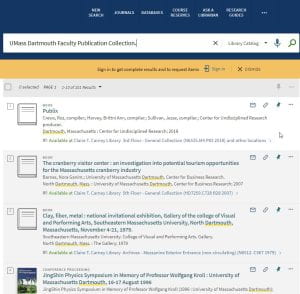Here is the latest news in UMD faculty, staff, and community publishing and research:
The Women’s and Gender Studies Department and the University of Rhode Island co-published the fall 2023 issue of the Journal of Feminist Scholarship titled “Translating Transnational Feminisms.” The issue, co-edited by Associate Professor Erin Krafft (Crime & Justice Studies) and Caroline De Souza (’22), argues for the integral position of feminist translation practices and the theories of Feminist Translation Studies as tools for both local and transnational feminist solidarities.Professor Avijit Gangopadhyay (Estuarine & Ocean Sciences) co-published “Recent changes in the upper oceanic water masses over the Indian Ocean using Argo data” in Scientific Reports. The article quantifies different contributions of pure warming and pure freshening processes on the long-term thermohaline changes observed in the Argo era (2003-2019).Professor Brian Williams (History) wrote an article in The Conversation discussing the differences and similarities between ISIS and Hamas by comparing each group’s beliefs and tactics.Assistant Professor Jonathan Kush’s (Management & Marketing) paper “Communication networks and team performance: selecting members to network positions” was adapted into a radio program as part of NSF’s The Discovery Files. The paper examined how individuals come to occupy communication network positions and the effect of selection processes on group performance.Emeritus Professor Fahri Karakaya (Management & Marketing) co-published “Cross Cultural Analysis of Facebook on Global Purchase” in the Journal of Marketing Development and Competitiveness. The article examines the impact of brand influencers, brand generated content, and brand engagement on culture.Senior Advisor to the Chancellor for Economic Development and Strategic Initiatives Michael Goodman co-published a report that analyzed offshore wind companies’ impact on the SouthCoast economy and workforce. The first two years of construction on wind turbines employed nearly 2,000 Massachusetts residents.Associate Professor Robert Darst (Political Science), Associate Professor Gavin Fay (Fisheries Oceanography), and Associate Dean of the College of Engineering Iren Valova co-published “Climate Resilience in Coastal Massachusetts: A Survey of Municipal Challenges, Plans, and Needs” in MassBenchmarks Journal . The piece details the efforts of the Northeast Center for Coastal Resilience, a collaboration across the UMass system, which conducted a survey on coastal resilience in Massachusetts municipalities and produced a comprehensive report on climate-change hazards, resilience strategies, and barriers.Emeritus Professor Fahri Karakaya (Marketing) co-published a chapter titled “Demographics on the use and Importance of nutrition Labels” in Advances in Health Sciences. The chapter examines the research literature on the impact of governmental programs and other food label initiatives.
Do you need help accessing any of these publications? The librarians have you covered. Contact our reference staff: https://lib.umassd.edu/about/staff-directory/contact-rils/




